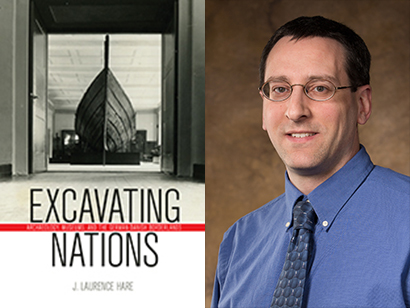
FAYETTEVILLE, Ark. – Do relics from the ancient past help shape modern national identities?
They did for more than a century in Germany and Denmark, according to University of Arkansas historian J. Laurence Hare, who examines the emergence of antiquarianism in the German-Danish border regions in his new book, Excavating Nations: Archaeology, Museums and the German-Danish Borderlands.
Hare details the critical roles played by the German state of Schleswig-Holstein and the Southern Jutland region of Denmark in the emergence of professional prehistoric archaeology and how archaeological discoveries formed conceptions of German and Scandinavian origins.
Hare, an associate professor of history in the J. William Fulbright College of Arts and Sciences, writes that the ancient sites and artifacts of the borderlands “enchanted both Germans and Danes from nineteenth-century Romantics to twentieth-century Nazis and beyond. They evoked a mythological past while offering potent symbols for the present.”
“This region was a hinge-point of identity because it connected Germans and Scandinavians to a common heritage,” Hare said. “The reality is these artifacts are neither German nor Danish. They stem from cultures that don’t identify in these modern terms, but that becomes problematic for establishing a nation’s history.”
Excavating Nations describes the emergence of popular antiquarianism and the founding of the first regional museums in the early 19th century. It then explores how regional antiquity influenced border conflicts in the late 19th and early 20th centuries. The book ends with a consideration of the region’s role in the Nazi use of Nordic antiquity and the impact of archaeology on the transformation of the borderlands in the period after World War II.
Hare studied correspondence between members of a cross-border network of antiquarians and archaeologists and investigated reports from museum, university and state archives across Germany and Denmark.
BATTLING OVER A BOAT
One of most celebrated artifacts discussed in the book is the Nydam Boat, an oak vessel dating to the early fourth century that was uncovered in a bog in Denmark in 1863 by Conrad Engelhardt and put on display in a museum in Schleswig-Holstein, which at the time was a part of Denmark. It is now on display in the Schleswig-Holstein Museum of Antiquities.
“The Nydam Boat was hotly contested between German and Danish antiquarians,” Hare said. “When the Second Schleswig War broke out in 1864, Prussian archaeologists wanted to relocate the boat to Berlin. So Engelhardt disassembled it and hid it. For generations, every time the German-Danish border issue came up, ownership of the boat was debated. It is an important artifact, but it also suggests the mentality the Germans and Danes are attaching to their national history.”
Hare concludes the book with a joint restoration project carried out by Germans and Danes in 2001 at an ancient fortification called the Danevirke. The wall was completed in the eighth century in Denmark to keep out the forces of Charlemagne and became a powerful symbol for Danes during the 1800s – until the Germans won the Second Schleswig War in 1864 and took possession of the region.
“There are layers upon layers of history at this site,” Hare said. “And then, after all the years of conflict, at a site of acrimony, they decided to preserve the wall together. It speaks to the denouement of the conflict. This is the place where two peoples have come together to share a past and recognize overlapping values. It is on the German side of the border, but the museum has flags from both countries and all of the exhibits are in German and Danish.”
Excavating Nations is published as part of the German and European Studies Series by the University of Toronto Press.
About the J. William Fulbright College of Arts and Sciences: Fulbright College is the largest and most academically diverse unit on campus with 19 departments and 43 academic programs and research centers. The college provides the core curriculum for all University of Arkansas students and is named for J. William Fulbright, former university president and longtime U.S. senator.
About the University of Arkansas: The University of Arkansas provides an internationally competitive education for undergraduate and graduate students in more than 200 academic programs. The university contributes new knowledge, economic development, basic and applied research, and creative activity while also providing service to academic and professional disciplines. The Carnegie Foundation classifies the University of Arkansas among only 2 percent of universities in America that have the highest level of research activity. U.S. News & World Report ranks the University of Arkansas among its top American public research universities. Founded in 1871, the University of Arkansas comprises 10 colleges and schools and maintains a low student-to-faculty ratio that promotes personal attention and close mentoring.
Contacts
J. Laurence Hare, associate professor, history
J. William Fulbright College of Arts and Sciences
479-575-5890, lhare@uark.edu
Chris Branam, research communications writer/editor
University Relations
479-575-4737, cwbranam@uark.edu